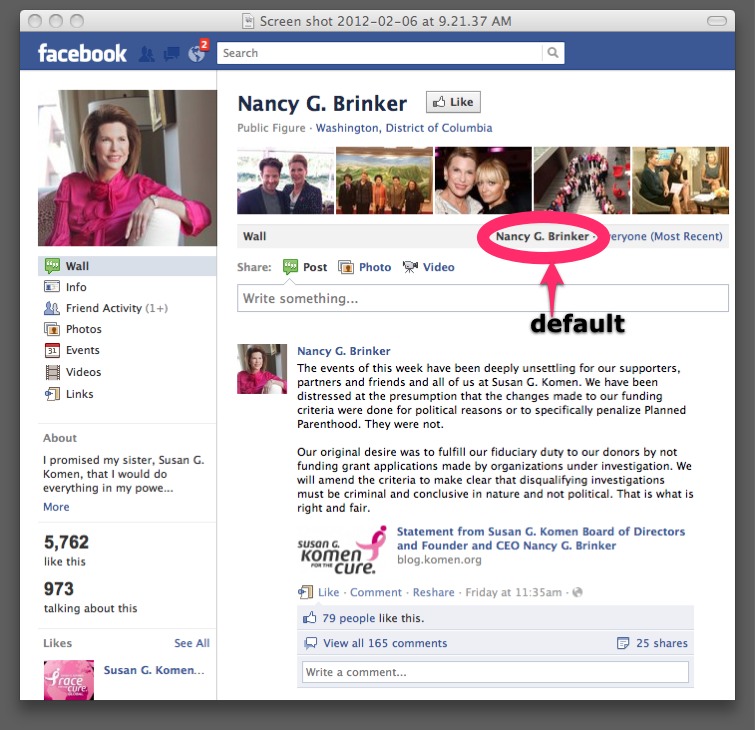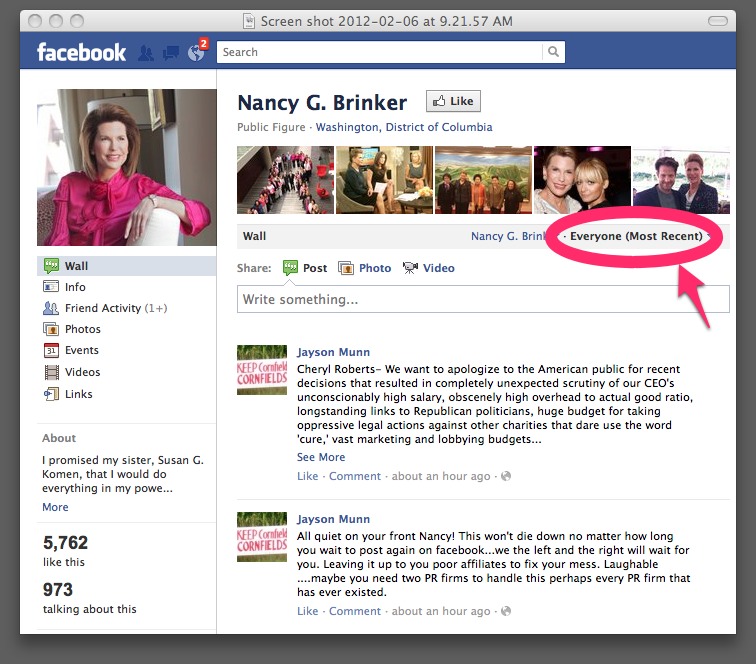I am a huge fan of pointing out mistakes social media marketers make, not to show up people who may be acting poorly or simply showing bad form (heavens!). More to the point, we should call out “worst practices” lest people think such things are OK and get the actors to answer questions about the questionable (sometimes the answers are pretty good). All considered, we ought to like to learn from and teach each other.
On the other hand, I note that there is a rush to judgment at times. We’re all guilty about it. In the scramble to write up a “lessons learned” post (can we please find another way to say that?), we take what scant info we bothered to half-read and offer our categorical condemnation.
What’s the motivation? Being the first to “thought-leader” the issue? Bragging rights for being a smarty? When did we need online proof to go swaggering and boasting? Bah humbug. Let’s put the journalistic skills most of us never learned to good use.
Komen
The case of the Susan G. Komen Fondation’s controversy about pulling funds from Planned Parenthood is a week old already as I type this, but it’s still worth talking about. Kneejerk reaction abound, obviously in the political (or was it?) reactions to the Komen Foundation’s actions, and the subsequent retraction (or was it?). even on the facts of the story it’s not easy to pass correct judgment.
More to my point, there was a reaction to the perceived deleting of comments and posts on the Facebook wall of Nancy Brinker, head of the Komen Foundation. I heard complaints, many from friends, that posts were disappearing. When I went to the page, I found the posts in question easily; the default view on Brinker’s wall showed her posts only, but a simple click on the “Everyone” tab showed the missing posts (see screenshots for what I mean).
Does this mean no posts were deleted? I have no way of knowing that, and some friends still insist there were. But the fact remains that hundreds (OK I didn’t count) of critical posts remain on the wall, among less-frequent calls of support and posts by Sprinker et al. Our gut often tells us to expect the worst, even if we disagree- but in this case, many people forgot a simple function of the Facebook wall, which is frankly embarrassing. My biggest fear is that social media keynoters start loading this up into their “These Companies Don’t Get It” presentation decks without checking all the facts.
McDonald’s
 Another recent episode was McDonald’s who paid for a “Promoted Trend” on Twitter called “McD’s Stories.” Anyone could tell you such a big brand would attract trolls and haters, especially as not everyone is a fan of fast food. I’ll call myself out here, as I initially knee-jerked some statements that I thought McDonald’s screwed up. I quickly was corrected (for the record, by some friends and colleagues who were screaming about the Komen deletions); more importantly, was reminded that a big brand will always get the haters (I see this every day), but that does not mean the bad posts are the norm (but face it, we love to see fantastic stories about people finding lemur paws in their Big Macs*)
Another recent episode was McDonald’s who paid for a “Promoted Trend” on Twitter called “McD’s Stories.” Anyone could tell you such a big brand would attract trolls and haters, especially as not everyone is a fan of fast food. I’ll call myself out here, as I initially knee-jerked some statements that I thought McDonald’s screwed up. I quickly was corrected (for the record, by some friends and colleagues who were screaming about the Komen deletions); more importantly, was reminded that a big brand will always get the haters (I see this every day), but that does not mean the bad posts are the norm (but face it, we love to see fantastic stories about people finding lemur paws in their Big Macs*)
Also, we tend to judge these situations without talking to the principals involved- in this case, a problem alleviated by Realtime Report with this interview of McDonald’s Rick Wion. In fact, those of us who blog, speak or otherwise opine about these situations often do so without really knowing what went on behind the scenes- I have seen enough people do these far-from-complete “this company doesn’t get it” case studies that I hope I don’t ever do such a thing myself (we’ll see about that).
For Pete’s sake- take a breath before popping off about something. Maybe run out for a sack of lemur-burger’s from McD’s. I’ll try to do the same (no promises).
*I made that up
Photo credit: wallygrom on Flickr



This is ridiculous! anyway, thanks for this info! :)